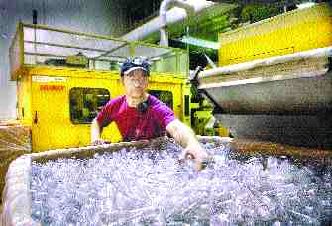forum
library
tutorial
contact

Fuel Costs Bite into Bottom Line
by Scott Wyland & John DodgeThe Olympian, December 12, 2000
|
the film forum library tutorial contact |

|
Fuel Costs Bite into Bottom Lineby Scott Wyland & John DodgeThe Olympian, December 12, 2000 |
Manufacturers use diesel fuel, work slowdowns to trim costs
 TUMWATER -- As winter descends on South Sound, some manufacturers
are feeling a sharper bite from rising energy costs than from dipping
temperatures.
TUMWATER -- As winter descends on South Sound, some manufacturers
are feeling a sharper bite from rising energy costs than from dipping
temperatures.
Tumwater-based CNC Container Corp. is being hit especially hard because it buys electricity on the open market.
Since last year, wholesale electric rates have surged from $30 a megawatt hour to around $3,000 a megawatt hour on Monday -- a hundredfold increase, said Mel White, CNC president and chief executive officer.
That would be like gasoline jumping from $1.70 a gallon to $170, White said.
"It's just absolutely unbelievable what's happening," White said. "A lot of companies are going to go out of business. We just hope like hell we're not one of them."
As a remedy, the company installed seven diesel-powered generators to replace the power it was buying from Puget Sound Energy.
To further trim costs, CNC recently laid off six office workers and began requiring employees to pay 25 percent of their medical premiums, White said.
White said the company used to pay 100 percent of premiums.
CNC has also shut down the local plant temporarily several times and let workers take sick time, White said.
"But we can't keep doing that," White said.
Power squeeze
CNC is one of about 20 Puget Sound Energy customers in a nine-county service area which, by choice, buys their electricity on the wholesale market, said PSE spokeswoman Dorothy Bracken.
When energy prices are low, these large industrial customers benefit. When prices are high, they pay more than other industrial customers with fixed rates.
"The wholesale market was looking good until the middle of the year," Bracken said.
Electricity rates began ballooning in May and have hit an all-time high, White said.
At these rates, running CNC's machinery would cost $750,000 a day, compared with the $250,000 a month they were paying last year, White said.
White estimates that CNC will pay $3.5 million to $4 million more to run the Tumwater plant this year.
"Next year looks scary, frankly," White said.
The generators will cost $750,000 to run for two months, which is cheaper than paying high electric rates but still more than CNC wants to fork out, White said.
CNC belongs to a trade group called the Industrial Customers of Northwest Utilities, which is filing a complaint with the Washington Utilities and Transportation Commission, arguing that spot-market rates are overpriced.
The Northwest companies are paying the highest wholesale rates in the country, said Melinda Davison, a Portland attorney representing the group. "We do not think this is a just and reasonable rate for customers."
The complaint is being filed mainly on behalf of a dozen Washington companies, Davison said.
If the group files its complaint today, the utility commission will set a special meeting Wednesday to review it, utility commission spokeswoman Marilyn Meehan said.
CNC's Tumwater plant employs 235 workers and is the only factory that makes plastic bottles in Washington, White said.
If the factory were to close because of high energy costs, beverage makers would have to order containers from plants in California or other states, White said.
Gas shortage
The recent cold snap has put a strain on the region's natural gas supply, prompting PSE to curtail industrial use so the bulk of the gas can be used for heating homes.
Some businesses are on natural gas contracts that allow PSE to interrupt service or to order companies to use an alternative fuel.
For instance, at midnight Sunday, Columbia Beverage Co. began using diesel for its production, and Miller Brewing Co. switched to oil.
Natural-gas prices have shot up 65 percent to 70 percent in the last month, said Dale Wetsig, Columbia Beverage Co.'s general manager.
Columbia is now paying $28,000 a month to run its bottling plant, up from $17,000 per month a year ago, Wetsig said.
However, electric rates haven't climbed noticeably because Columbia's contract with PSE keeps the rates fairly consistent, Wetsig said.
The company's 130 employees process 30 million cases of beverages a year, including PepsiCola, Dr. Pepper and 7-Up, Wetsig said.
At Miller, the brewery is now burning a week's supply of oil stockpiled for emergency backup, said Denise Quinn, plant manager.
Miller signed an agreement with PSE in 1997 that prevented the utility from raising gas rates until 2001, Quinn said.
Beginning Jan. 1, gas rates for industrial users will go up by 1.5 percent.
The switch during the power crunch from natural gas to diesel and other fuels is not without a certain toll on the environment, said Craig Weckesser, spokesman for the Olympic Air Pollution Control Authority.
"In terms of air quality, it means more particulate matter and sulfur dioxide are emitted into the air," Weckesser said.
learn more on topics covered in the film
see the video
read the script
learn the songs
discussion forum
